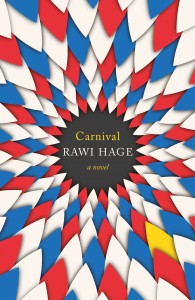 Published by Hamish Hamilton 1 August 2013
Published by Hamish Hamilton 1 August 2013
304pp, hardback, £16.99
Reviewed by N.J. Cooper
Occasionally a novel crosses your desk that is so extraordinary you wonder why everyone isn’t reading it. Carnival is one of the best.
A picaresque narrative, starring a taxi-driver known as Fly, it lays bare all the absurdities and cruelties of modern life in the west. Fly was born into a circus that roamed through Europe. His father was a camel-owning practitioner of the flying carpet and his mother a trapeze artist. After the flying-carpet star disappeared, the trapeze artist hanged herself from her own ropes and was buried ‘between the Danube and the heel of Italy’. Their young son was unofficially adopted by the bearded lady, who took him across the sea to the country where he now lives.
As the novel begins, the bearded lady is long dead and Fly earns his rent and food by driving everyone from the irresponsible drunken rich to the bullied and bullying denizens of the underworld. His professional life is centred on the Café Bolero, where the other taxi drivers eat, swap stories of their adventures and offer wise words to neophytes. Home is a room filled with towers of books, arranged according to Fly’s own rational but eccentric classification. The only other object in the room is his father’s carpet, on which Fly lies nightly, masturbating to fantasies of long-gone battles and heroic episodes from his vast library.
Memories of Fly’s hard but colourful past in the circus are interwoven with scenes from the taxi-driving present. Drug-dealers and hookers, industrialists, and masked carnival revellers pass through Fly’s days, all taking something from him but many adding their unlikely riches to his store.
Although, according to the rules of the form, there is no sustained plot, there are developments. By the end of the novel Fly’s romantic dreams have found a strange kind of fulfilment. People have been killed, but the killers’ motives were revealed long before they committed their crimes.
The series of vignettes builds into a portrait of our so-called civilization that would be unutterably depressing were it not for the flashes of human kindness that lighten the characters’ misery, just as the wit and erudition of the narrative lighten the experience of reading about them.
My copy of Carnival bristles with so many small Post-its marking memorable phrases that it would be impossible to quote them all. But some are irresistible. When the circus is facing financial disaster one winter, ‘And then food became scarce and the animals’ bones bulged against their sides.’ Throughout, the style is deceptively simple and every sentence sparkles. This is an exceptional novel.
